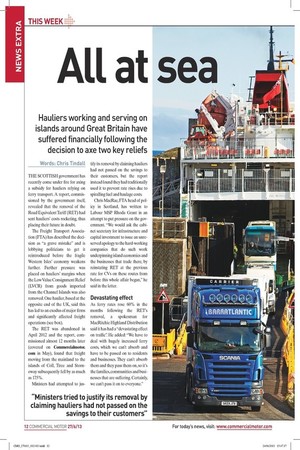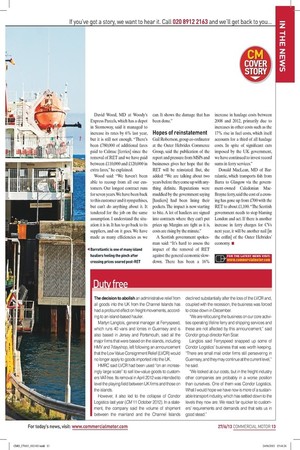sea ALL at Hauliers working and serving on islands around
Page 9

Page 10

If you've noticed an error in this article please click here to report it so we can fix it.
Great Britain have suffered financially following the decision to axe two key reliefs THE SCOTTISH government has recently come under fire for axing a subsidy for hauliers relying on ferry transport. A report, commissioned by the government itself, revealed that the removal of the Road Equivalent Tariff (RET) had sent hauliers' costs rocketing, thus placing their future in doubt.
The Freight Transport Association (FTA) has described the decision as "a grave mistake" and is lobbying politicians to get it reintroduced before the fragile Western Isles' economy weakens further. Further pressure was placed on hauliers' margins when the Low Value Consignment Relief (LVCR) from goods imported from the Channel Islands was also removed. One haulier, based at the opposite end of the UK, said this has led to an exodus of major firms and significantly affected freight operations (see box).
The RET was abandoned in April 2012 and the report, commissioned almost 12 months later (covered on Commerciahnotor. corn in May), found that freight moving from the mainland to the islands of Coll, Tiree and Stornoway subsequently fell by as much as 17.5%.
Ministers had attempted to jus tify its removal by claiming hauliers had not passed on the savings to their customers, but the report instead found they had traditionally used it to prevent rate rises due to spiralling fuel and haulage costs.
Chris MacRae, FTA head of policy in Scotland, has written to Labour MSP Rhoda Grant in an attempt to put pressure on the government. "We would ask the cabinet secretary for infrastructure and capital investment to issue an unreserved apology to the hard-working companies that do such work underpinning island economies and the businesses that trade there, by reinstating RET at the previous rate for CVs on these routes from before this whole affair began," he said in the letter.
Devastating effect As ferry rates rose 60% in the months following the RET's removal, a spokesman for MacRitchie Highland Distribution said it has had a "devastating effect on traffic': He added: "We have to deal with hugely increased ferry costs, which we can't absorb and have to be passed on to residents and businesses. They can't absorb them and they pass them on, so it's the families, communities and businesses that are suffering. Certainly, we can't pass it on to everyone." David Wood, MD at Woody's Express Parcels, which has a depot in Stornoway, said it managed to increase its rates by 6% last year, but it is still not enough. "There's been £780,000 of additional fares paid to Calmac [ferries] since the removal of RET and we have paid between £110,000 and £120,000 in extra fares," he explained.
Wood said: "We haven't been able to recoup from all our customers. Our longest contract runs for seven years. We have been back to this customer and it sympathises, but can't do anything about it. It tendered for the job on the same assumption. I understand the situation it is in. It has to go back to its suppliers, and on it goes. We have made as many efficiencies as we can. It shows the damage that has been done."
Hopes of reinstatement Gail Robertson, group co-ordinator at the Outer Hebrides Commerce Group, said the publication of the report and pressure from MSPs and businesses gives her hope that the RET will be reinstated. But, she added: "We are talking about two years before they come up with anything definite. Reputations were muddied by the government saying [hauliers] had been lining their pockets. The impact is now starting to bite. A lot of hauliers are signed into contracts where they can't put prices up. Margins are tight as it is, costs are rising by the minute."
A Scottish government spokesman said: "It's hard to assess the impact of the removal of RET against the general economic slowdown. There has been a 16% increase in haulage costs between 2008 and 2012, primarily due to increases in other costs such as the 17% rise in fuel costs, which itself accounts for a third of all haulage costs. In spite of significant cuts imposed by the UK government, we have continued to invest record sums in ferry services."
Donald MacLean, MD of Barralantic, which transports fish from Barra to Glasgow via the government-owned Caledonian MacBrayne ferry, said the cost of a crossing has gone up from £700 with the RET to about £1,100. "The Scottish government needs to stop blaming London and act. If there is another increase in ferry charges for CVs next year, it will be another nail [in the coffin] of the Outer Hebrides' economy. •








































